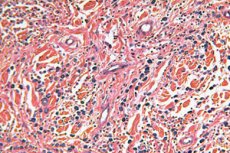Nye publikasjoner
Kunstig intelligens kan bidra til å oppdage spredning av brystkreft uten biopsi
Sist anmeldt: 02.07.2025

Alt iLive-innhold blir gjennomgått med medisin eller faktisk kontrollert for å sikre så mye faktuell nøyaktighet som mulig.
Vi har strenge retningslinjer for innkjøp og kun kobling til anerkjente medieområder, akademiske forskningsinstitusjoner og, når det er mulig, medisinsk peer-evaluerte studier. Merk at tallene i parenteser ([1], [2], etc.) er klikkbare koblinger til disse studiene.
Hvis du føler at noe av innholdet vårt er unøyaktig, utdatert eller ellers tvilsomt, velg det og trykk Ctrl + Enter.

En ny studie har funnet ut at kunstig intelligens (KI) kan bidra til å identifisere brystkreft som har spredt seg til andre deler av kroppen uten behov for biopsier.
Kunstig intelligens analyserer MR-skanninger for å oppdage tilstedeværelsen av kreftceller i lymfeknutene under armene, sier forskere.
I klinisk praksis kan kunstig intelligens bidra til å unngå 51 % av unødvendige kirurgiske lymfeknutebiopsier for å sjekke for kreft, samtidig som den korrekt identifiserer 95 % av pasienter med spredt brystkreft, fant studien.
De fleste dødsfall fra brystkreft skyldes spredning til andre deler av kroppen, og kreften sprer seg vanligvis først til en lymfeknute i armhulen, forklarte hovedforsker Dr. Basak Dogan, direktør for brystavbildningsforskning ved University of Texas Southwestern Medical Center.
Å oppdage kreft som har spredt seg til en lymfeknute «er avgjørende for å ta behandlingsbeslutninger, men tradisjonelle bildebehandlingsteknikker er ikke følsomme nok til å oppdage det effektivt», sa Dogan i en pressemelding fra det medisinske senteret.
Pasienter med godartede MR- eller nålebiopsiresultater blir ofte tvunget til å gjennomgå kirurgisk lymfeknutebiopsi fordi disse testene kan overse et betydelig antall kreftceller som har spredt seg utover brystet, la Dogan til.
Forskerne trente opp AI-en ved hjelp av MR-skanninger av 350 nydiagnostiserte brystkreftpasienter som hadde kreft funnet i lymfeknutene.
Testing viste at den nye AI-en var betydelig bedre til å identifisere slike pasienter enn leger som brukte MR eller ultralyd, rapporterte forskerne i tidsskriftet Radiology: Imaging Cancer.
«Dette er et viktig gjennombrudd fordi kirurgiske biopsier har bivirkninger og risikoer til tross for den lave sannsynligheten for et positivt resultat som bekrefter tilstedeværelsen av kreftceller», forklarte Dogan. «Å forbedre vår evne til å utelukke tilstedeværelsen av kreftceller i lymfeknuter under rutinemessig MR ved bruk av denne modellen kan redusere denne risikoen og dermed forbedre kliniske resultater.»
